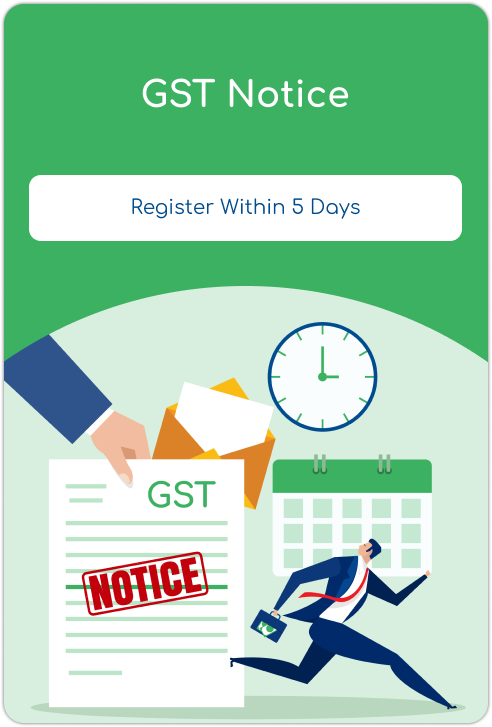
GST Notices
963 customers
What will you get?
Drafting the reply
Response Submission
Analysis and Assessment
Follow-Up and Communication
Compliance and Implementation
Monitoring and Resolution
Appeal
What do we Require?
INR 43154 Taxes As Applicable









Introduction
GST Notices are official communications from GST Authorities to taxpayers, aimed at reminding or cautioning them about detected defaults in GST compliance or requesting additional information. Responding promptly within the specified timeframe is crucial, as failure to do so may result in legal consequences such as prosecution or penalties for wilful default. Taxpayers must handle GST notices diligently to ensure compliance. ProMunim of India, a team of experts, is dedicated to helping taxpayers navigate the complexities of GST notices. They can assist in preparing and submitting responses effectively, whether they have received a notice or anticipate one. Common grounds for receiving notices include failure to register under GST when required by law, late or non- filing of GST returns, underpayment or non-payment of GST, and incorrect claims of Input Tax Credit. Contact ProMunim of India for professional guidance and a quick reply.
Reasons:
- Non-Filing or Late Filing:Failure to file GST returns within the stipulated deadlines or filing them after the due date can trigger a notice from tax authorities.
- Incorrect Information:Errors or discrepancies in the GST returns, such as mismatched figures or incorrect input tax credit claims, may lead to a notice for clarification or correction.
- Discrepancies in Input Tax Credit (ITC):Discrepancies between the input tax credit claimed and the eligible credit as per GST regulations can prompt a notice for explanation or verification.
- Mismatch in Sales and Purchase Figures:Significant variations between sales and purchase figures reported in GST returns compared to previous periods or industry norms may raise flags and result in a notice.
- Non-Payment of GST Dues:Failure to pay GST dues, including tax liability, interest, or penalties, within the prescribed timeline can lead to notices for payment reminders or enforcement actions.
- Suspicion of Tax Evasion:Unusual patterns or discrepancies in GST filings that raise suspicion of tax evasion or fraudulent activities may prompt tax authorities to issue notices for investigation.
- Request for Clarification or Verification:Tax authorities may issue notices seeking clarification on specific transactions, declarations, or compliance-related matters to ensure accuracy and transparency in GST reporting.
- Audit or Assessment:Selection for GST audit or assessment by tax authorities can result in the issuance of notices requiring submission of additional documents, information, or explanations related to the audit process.
- Changes in GST Regulations:Notices may be issued to inform taxpayers about changes in GST laws, regulations, or compliance requirements, necessitating adjustments or actions to ensure compliance.
- Random Scrutiny:Tax authorities may conduct random scrutiny of GST returns or transactions to verify compliance with tax laws and regulations, leading to the issuance of notices for verification purposes.
GST Notices:
- Show Cause Notice (SCN):Issued when tax authorities suspect a violation of GST laws or incorrect reporting.
- Demand Notice:Determines tax liability, indicating the amount due, interest, or penalties.
- Scrutiny Notice:Sends a detailed examination of taxpayer's GST returns or documents to ensure compliance.
- Assessment Notice:Issued after assessing taxpayer's GST liability, stating the final amount and any adjustments.
- Recovery Notice:Issued if a taxpayer fails to pay the tax liability, specifying the outstanding amount and initiating recovery steps.
- Notice for Personal Hearing:Tax authorities may summon the taxpayer for a personal hearing to present their case or provide additional information.
Consequences for Non-response to Goods and Services Tax (GST) notices:
Non-response to Goods and Services Tax (GST) notices can have significant consequences for taxpayers. Ignoring or failing to respond to GST notices within the stipulated timelines may result in various penalties, fines, and enforcement actions by tax authorities. These consequences can include imposition of monetary penalties for non-compliance, suspension or cancellation of GST registration, seizure of assets, initiation of legal proceedings, and even prosecution for tax evasion or fraud. Additionally, non-response to GST notices may lead to adverse impacts on the taxpayer's credit rating, business reputation, and overall financial health. Therefore, it is crucial for taxpayers to promptly address and respond to GST notices, providing the necessary information or explanations to tax authorities to resolve any compliance issues and avoid further repercussions.
Mode of Recovery:
GST officers have several mechanisms at their disposal to recover demand amounts specified in GST notices from taxpayers. These mechanisms may vary depending on the nature of the demand, the taxpayer's compliance history, and the applicable laws and regulations. Some common methods used by GST officers to recover demand amounts include:
- Adjustment against Input Tax Credit (ITC):If a taxpayer has eligible input tax credit available, GST officers may adjust the demand amount against the taxpayer's outstanding ITC balance. This adjustment can help offset the demand without requiring direct payment by the taxpayer.
- Bank Account Attachment:GST officers may attach the taxpayer's bank accounts to recover the demand amount directly from the taxpayer's bank balance. This involves issuing instructions to the taxpayer's bank to freeze or transfer funds from the designated accounts to settle the outstanding demand.
- Property Attachment:In cases where monetary recovery is not feasible or insufficient, GST officers may initiate proceedings to attach and sell the taxpayer's movable or immovable properties to recover the demand amount. This typically involves issuing notices to the taxpayer and conducting auctions or sales of the attached properties.
- Garnishment of Receivables:TIf the taxpayer has receivables from customers or other parties, GST officers may garnish these receivables to recover the outstanding demand amount. This entails issuing instructions to debtors to redirect payments to the tax authorities instead of the taxpayer.
- Seizure and Sale of Assets:In cases of persistent non-compliance or significant outstanding dues, GST officers may seize and sell the taxpayer's assets, such as inventory, equipment, or vehicles, to recover the demand amount. This typically requires obtaining court orders or following legal procedures for asset seizure and disposal.
- Tax Recovery Certificate (TRC):GST officers may issue a Tax Recovery Certificate (TRC) against the taxpayer, enabling them to recover the demand amount as an arrear of land revenue. This certificate empowers tax authorities to initiate recovery proceedings under the relevant laws, including attachment of properties and bank accounts.
- Enforcement Actions:In extreme cases of non-compliance or tax evasion, GST officers may resort to enforcement actions such as arrest, prosecution, or imposition of penalties to compel the taxpayer to settle the outstanding demand amount.
How ProMunim works for GST Notice Resolution:
ProMunim, a comprehensive GST compliance service provider, offers a streamlined process for handling GST notices to ensure efficient resolution and compliance for businesses. The ProMunim service process for GST notices typically involves the following steps:
- Notice Intimation:ProMunim promptly notifies clients upon receipt of GST notices from tax authorities. Clients are informed about the nature of the notice, its implications, and the required actions to be taken.
- Document Collection:our team assists clients in gathering the necessary documents, records, and information relevant to the GST notice. This may include GST returns, invoices, financial statements, and any other supporting documentation requested by tax authorities.
- Analysis and Assessment:ProMunim conducts a thorough analysis of the GST notice to understand the underlying compliance issues and implications for the client's business. This involves reviewing the notice details, assessing the accuracy of tax calculations, and identifying any discrepancies or areas of concern.
- Response Preparation:Based on the analysis, our legal team prepares a comprehensive response to the GST notice on behalf of the client. The response includes detailed explanations, clarifications, and supporting documentation to address the queries raised by tax authorities and resolves the compliance issues effectively.
- Communication with Tax Authorities:ProMunim liaises with tax authorities on behalf of the client to submit the response to the GST notice and communicate any additional information or clarifications as required. This ensures timely and accurate correspondence with tax authorities throughout the resolution process.
- Follow-Up and Monitoring:We monitor the progress of the GST notice resolution process and follows up with tax authorities to ensure timely action and closure of the compliance issues. Any further communication or requests from tax authorities are promptly addressed to expedite the resolution process.
- Compliance Advisory:In addition to addressing the specific issues raised in the GST notice, ProMunim provides on-going compliance advisory services to help clients maintain adherence to GST regulations and avoid future notices or penalties.
- Documentation and Record-keeping:ProMunim assists clients in maintaining proper documentation and records related to the GST notice resolution process. This includes retaining copies of responses, communications with tax authorities, and any other relevant documents for future reference and audit purposes.
By leveraging ProMunim's expertise and dedicated support, businesses can navigate GST notices with confidence, ensuring timely compliance and minimizing the risk of penalties or enforcement actions.

